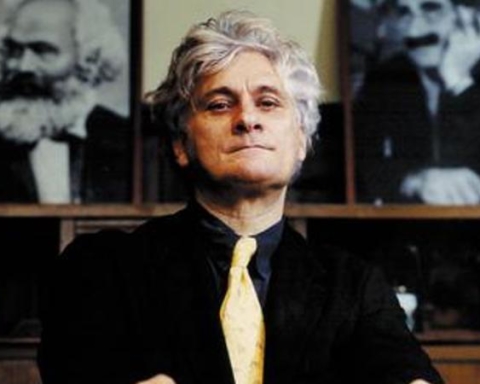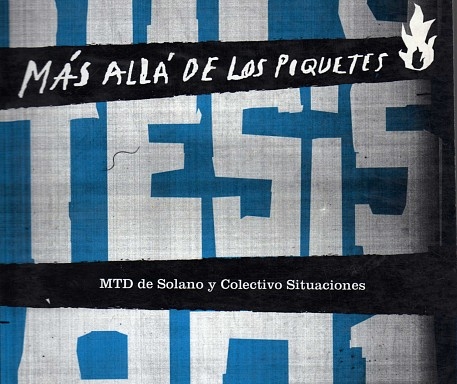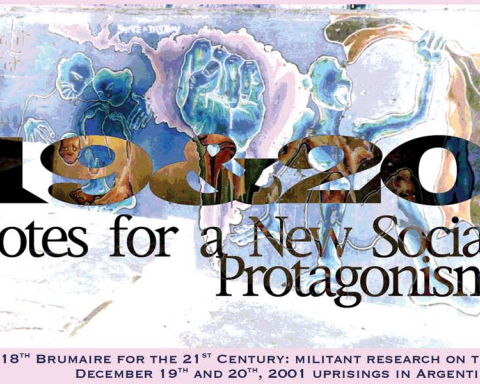Translated by: Ana Vivaldi & Liz Mason-Deese
Bifo’s recent book AND: Phenomenology of the End deals with processes of subjectivation which, through communication, information technology, and the government of signs, determine our modes of life and affect the political conjuncture. His central argument emerges from describing the transition from a world in which the relation between bodies and signs was processed through sensitivity (a conjunctional concatenation) to a regime in which we only operate with already codified signs, and with combinations that have already been pre-established by a prior compatibility (connective concatenation). This transformation follows the recent virtual revolution in semiocapitalism, in which capital is valorized through the production of signs, that is due both to a technological transformation and an ontological rupture. This transformation and ontological rupture consist of the sign’s aspiration of autonomy in relation to its referent (in language, the link between the signifier/signified, and in finances the link between money/labor).
In other words the human animal suffers the consequences of their actions over the environment – the infosphere which is populated with information flows which circulate at a vertiginous speed – that they have irreversibly modified and to which now they only aspire to adapt.
The infinite emission of information becomes incompatible with the capacity of the individual and social brain to receive/metabolize, it becomes impossible for the human brain. This transformation of the environment is thus inseparable from an anthropological mutation that the author describes both from the perspective of new technological patterns and from that of the new power of finance and the pathologies that subjects suffer.
The digital revolution disrupts the way in which the body is connected to signs, to the detriment of sensitivity, (tactile) sensoriality, and sensuality (pleasure-pain). That is, the loss of all the components that produce empathy. General desensitization neutralizes the critical power of culture and annuls the availability of the necessary time for erotic bonds, without which there is neither individual happiness nor the capacity to articulate counterpowers. This regeneration of sensitivity – in parallel to the loss of the sense of history – is not, however, for Bifo the effect of technological development on its own, but rather the conditions established by large capitalist corporations for this development.
II
For those who don’t know him, this activist philosopher from Bologna, who is around 70 years old, is a prolific author whose work has been published in Argentina for years with great interest by different publishing houses. Bifo is one of the paradigmatic figures of the young Italian autonomist movement (also known as operaismo): he was one of the protagonists of the Italian 1968 movement – which in Italy extended until 1977 –, he founded the historical magazine A/traverso and the mythical Radio Alice (the first Italian pirate radio station). He was a close friend of Félix Guattari, who continues inspiring his work. He lived in New York for a few years where he got to know cyberpunk up close, and was the creator of TV Orfeo, the first community television channel in Italy. He is currently a professor of Social History of Communication at the Fine Arts Academy of Brera, Milan.
III
Bifo has a poetic and political idea of the body, the erotic and the social body, just as the uprising creates it and the artistic imagination anticipates it. Diagnosis (crisis of capitalism) and therapeutics (uprising, recomposition of an autonomous collective body) refer to the two great analytical and political traditions that he continues to rework: those corresponding to Italian workerism and a micropolitical cartography.
IV
Digitalization and semiocapitalism – understood through the workerist method of class struggle as compositionism (a reading of the variation in the technical and subjective aspects of proletarian cooperation) – are inseparable from the power of corporations over the programming and mechanisms of subjugation of the “general intellect” (of which Marx spoke about). Therefore, for Bifo there is no question of a desire to return to the past (nostalgia for the Fordist exploitation of labor power), nor of a phobia of technology. The only phobia registered in the text is directed toward capital, and is expressed, in aesthetic terms, as the rejection of a purism rooted in technology that prepares the smooth space in which the sign is separated from the sensual and productive body and is handed over to code, connectivity without a remainder, to which forms of labor are subordinated, and over which financial power reigns. This purism, curiously, has affected its most serious opponent, Leninism, whose revolutionary purity (which for Bifo is linked to an expression of Russian Orthodox Christianity) has led to a catastrophic voluntarism. So if we can no longer count on classic revolutionary politics to oppose the current semiocapitalist command, how will we respond to avoid collapse?
V
Bifo is criticized for being “pessimistic” (by Ricardo Forster and Jorge Alemán for example), because his description of the world as a cyber cell does not offer any way out. In any case, pessimism and optimism are narrow, useless categories. If optimism has turned into neoliberal futurism, pessimism is its flip side, a sad form of thought that is incapable of creating new possibilities.
The gesture Bifo produces is uncomfortable because it makes two movements: it shows us that we are immersed in a present with no solution, at the same time as it points us to problems and invites us to work. Read in this line it doesn’t create enthusiasm or discouragement, but rather it encourages us to produce. His main thesis about historical time argues that the time when acting implied transforming reality has passed. Rather, in our time, to act is the effort to adapt one’s self, or to update one’s self, when faced with the speed of change generated by the virtual, digital or technological revolution. This has important consequences for the left that inherits the legacy of revolution, condemned to impotence if it does not manage to develop a sense of irony that is capable of resituating itself within and against (against but within) this world. Insofar as, in semiocapitalism, we are all sinking in the same mud, the vanguard attitude that denounces or saves the “others” (who are alienated, ignorant, tricked) loses all relevance. Enlightened minorities become irrelevant in the face of collectives that work within the problems that are common to all of us.
VI
Lenin liked to say that irony and discipline were the Bolcheviques’ best values. Vladimir Jankelevich affirms that irony is a certain capacity of distance to manage new dispositions. For Bifo, irony is an insolvency of language, the ability to avoid overcoding. Irony is a feature of any authentic social movement.
VII
If we are within – if we are not foreign or external to the problems that overwhelm us –, thinking must start from that immanence. There is no way of resolving this “from above.” Rather than external gazes, distanced perspectives, or know-it-all readings, we need to map the complexity of the present based on experience itself. We owe each other situated explanations, to clash with the concrete obstacles overlooked by analysis that occurs from a distance. How do we know? Bifo maintains that our cognitive reality has mutated. Being “inside” problems no longer has anything to do with adopting moral commitments, but rather accounting for what we cannot do and what we can. When Bifo diagnoses a problem of the “desensitization” of society, he is touching on this type of situation. It is not, of course, about the end of sensitivity as such, but of its productivist modulation, which is prefigured, codified, submitted to an algorithmic logic. We are experiencing a reduction of the sensitive, the sensual, and the erotic as we become increasingly incapable of decodifying the not said, of inventing relations for signs with prior compatibility. When Bifo links this process with the death of politics, perhaps we should understand this death as the (tendential, not absolute) extinction of a virile will of intervention/control over a reified and still manageable world. Semiocapitalism will not be transformed – Bifo says – based on Machiavellian or Leninist maneuvers. In other words, what dies is politics as it was conceived by humanists and revolutionaries, or rather, a will of transformation consummated in a state.
VIII
What emancipatory practice would be capable of challenging semiocapital? What is happening to our political experiences? One possible key for interpreting recent Argentine history highlights the reduction – the modulation – of the sensitive. There is a continuum that goes from state terrorism to neoliberalism: from terror to competition. Rita Segato states it quite clearly: patriarchy is a metaphysics that treats the living as a simple thing to be manipulated. The practices of counterpower, from the Mothers of Plaza de Mayo to the women’s movement, from the movement of the unemployed to the struggles for land and in defense of the commons, have made a strong historicizing and resensitizing impression on the social fabric, with – in the meaning that Bifo gives the term – a notable sense of irony.
IX
Irony and sensitivity seem to be two of the possible key elements for de-stereotyping the political. Is it possible to think about modes of refusal and collective decision-making beyond the model that ranges from the Prince to the Party? To the extent that practices of sensitization operate as counterpowers in relation to labor exploitation, repression, racism, genocide, sexual oppression, and the destruction of nature by financial mega-operations, it is impossible to dissociate them from the two fundamental political capacities: imposing a limit on power and experimenting collective forms of decision-making. These two issues remain in the heart of the political, even if it is a post-human or post-revolutionary politics.
Then, we would have to reconstruct a theory of post-representative collective decision-making, in which the subjects that are critical of processes of capital accumulation would be displaced toward the center. It is not enough to critique verticalization and support horizontality. To the contrary, this passage toward non-representation implies the construction of a method, forms of composition, and new modes of leadership. So-called horizontality remains in a state of abstraction if it is disconnected from concrete modes of making decisions.
X
Marx had written that it is no longer about interpreting the world, as the philosophers claimed, but about transforming it: a new way of conceiving critique as practice. This aspect of critique is what enters into crisis in the world whose coordinates Bifo plots. Rather than transforming, as we already said, the postmodern subject is dedicated to updating their perceptions and knowledges in regards to an environment that is mutating at a dizzying speed. The change in experience is given in the passage from interpretation-transformation to updating-adaptation.
What type of comprehension can be practiced in relation to the reality that we experience under semiocapitalism? Perhaps the practice of translation – in the hands of all the struggles that desacralize, profane and return to common use the dimensions of praxis and collective wealth that capital axiomatizes, subordinating them to the market logic – provides us with a useful indication. Then, it is about counter-translating the world, understanding it by decodifying it, retaking the capacity for creating common meanings beyond the command of capital. This brings us back to irony: an open spatiality of translation of problems that traverse the individual and the collective.
2018-11-16





